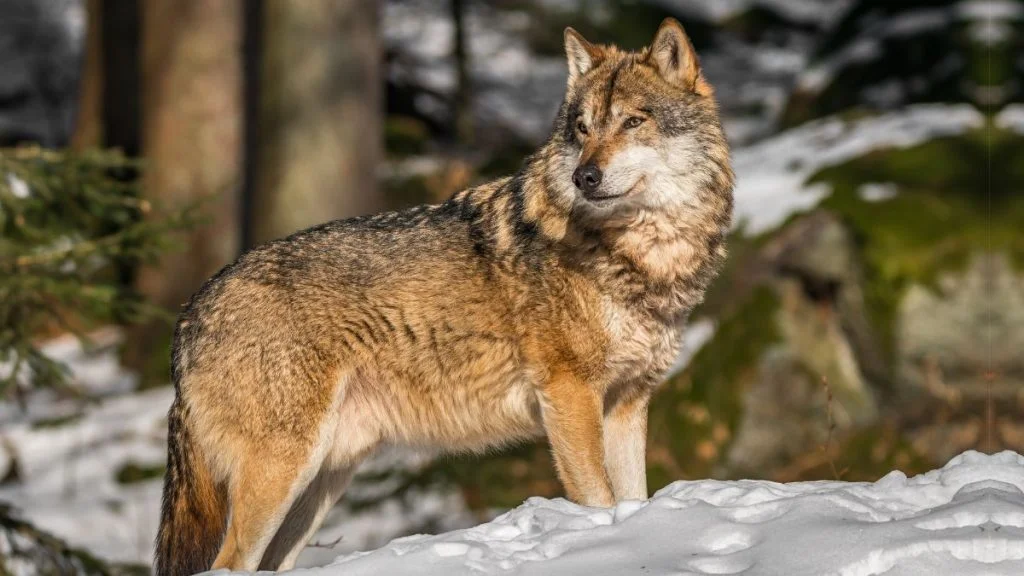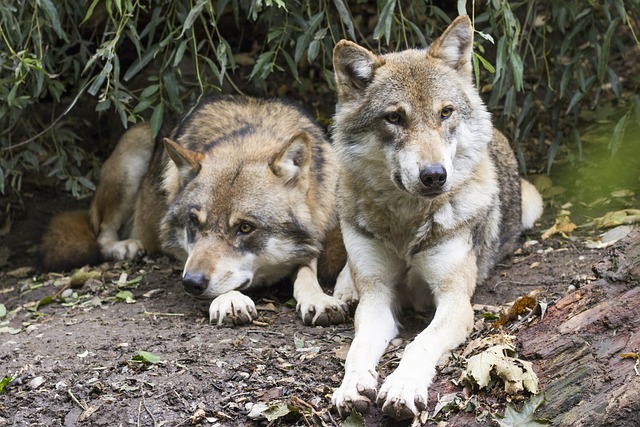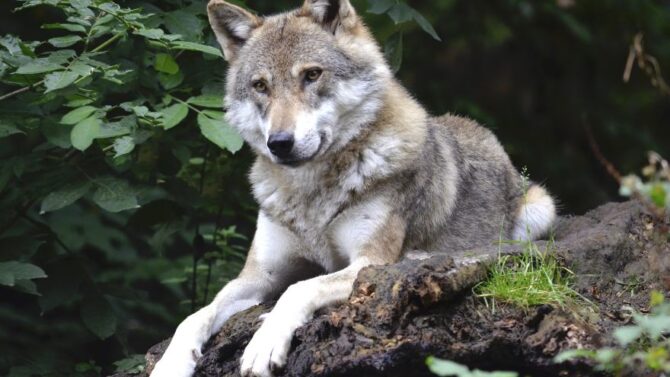Wolves are exotic-looking animals, and so many of us find their wild appearance appealing.
However, many animals have appealing appearances but shouldn’t be kept in a household.
But are wolves friendly to humans and pets, you may ask?
Indeed, some wolves can be domesticated; when that happens, they become friendly toward humans and bond closely with their owners. They might also exhibit doggy behaviors. However, not everyone can train a wolf to become a pet.
Wolves look cute, and their puppies can beat dog puppies in a cuteness competition.
They also have a mysterious air about them, such that we even romanticize certain aspects of being a wolf, like the “Alpha” and the “lone wolf.”
As such, it isn’t surprising that many people want to have one as a pet. Reality is often different from fantasy, however.
In this article, we shall talk more about what it means to own a wolf as a pet and why that isn’t a good idea.
What Makes a Wolf?
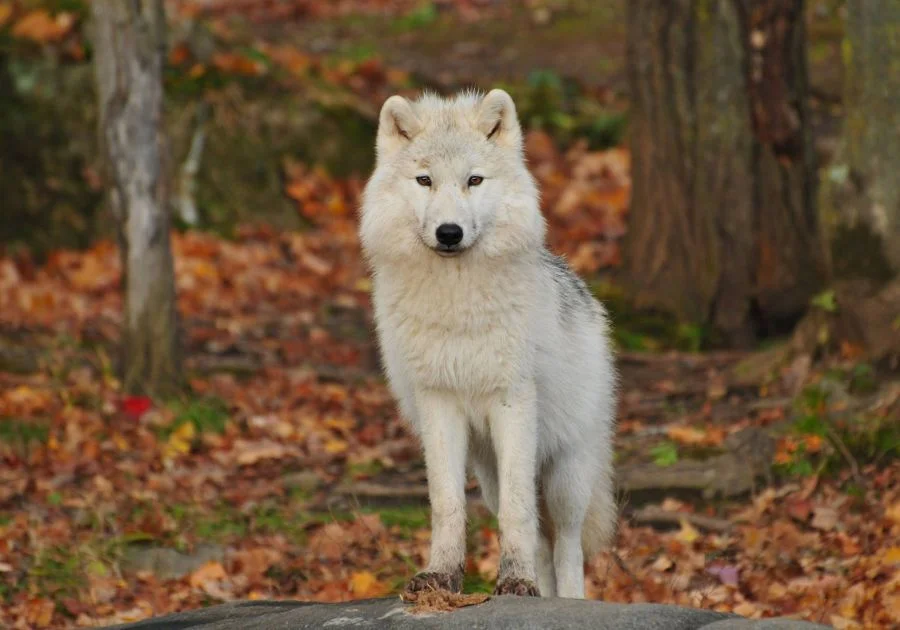
Let’s kick off by stating that owning a purebred wolf is illegal in the United States and most other parts of the world.
That said, people who want to own wolves often have Wolfdogs in mind, and any wolf with a little dog in it is considered a wolfdog.
While Wolfdogs aren’t illegal on the federal level, many states banned them.1
So, what is a wolf? And what is their relationship with dogs?
Wolves and dogs come from the same family, Canidae, and the wolf is considered the ancestor of all domestic dogs. It is also related to other small canids like coyotes and golden jackals.
Wolves move in packs and are known to hunt in groups. The pack mentality of our domestic dogs is directly gotten from wolves.
There are major differences between wolves and dogs, though.
Are Wolves and Dogs The Same?
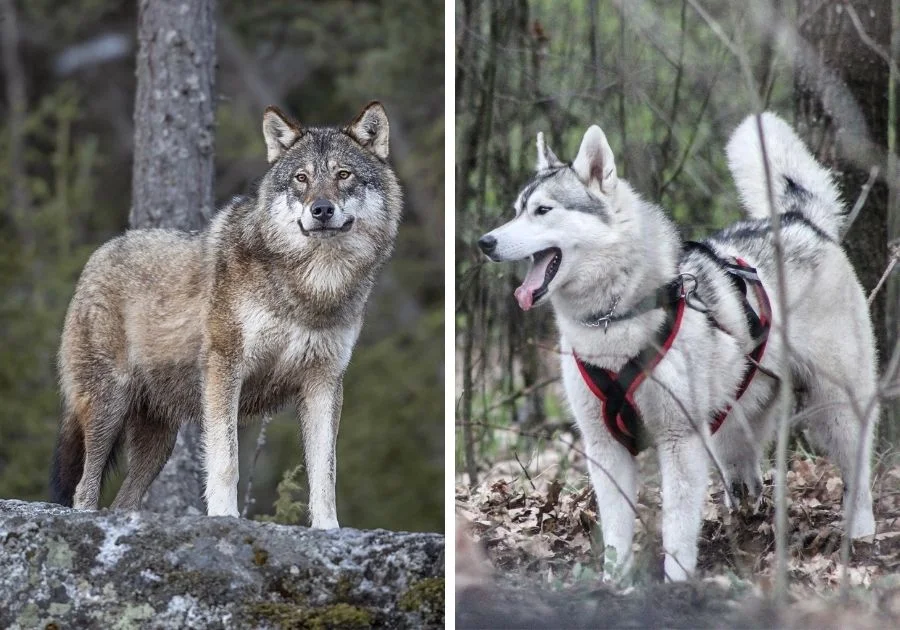
While they belong to the same family and are close relatives, there are a lot of differences between wolves and dogs. They include:
- Wolves tend to have bigger heads, long legs, and slender bodies. Some wolves are bigger than dogs, but that’s not an absolute rule, as we have some giant dogs out there.
- Wolves come with more toes than dogs; the extra toes are webbed to help them navigate snowy landscapes and swim.
- Wolves have bigger jaws, a nod to their predatory nature. Wolves need to catch and kill animals to survive, but not all dogs need that.
- Dog breeds have different eye colors, like blue and brown, but all wolves come with a shade of yellow or gold.
- Dogs tend to bark, though some, like the Siberian Husky, howl. Wolves often howl.
- Wolves are highly carnivorous, and feeding a wolf requires a high amount of meat. A dog’s diet is broad, and it can eat meat, vegetable, and grains.
- Baby wolves often come during spring, while puppies can come at any time of the year.
- Dogs are bred to be man’s best friend. Wolves are wild, carefree, and meant to live away from humans.
Are Domesticated Wolves Friendly to Humans?
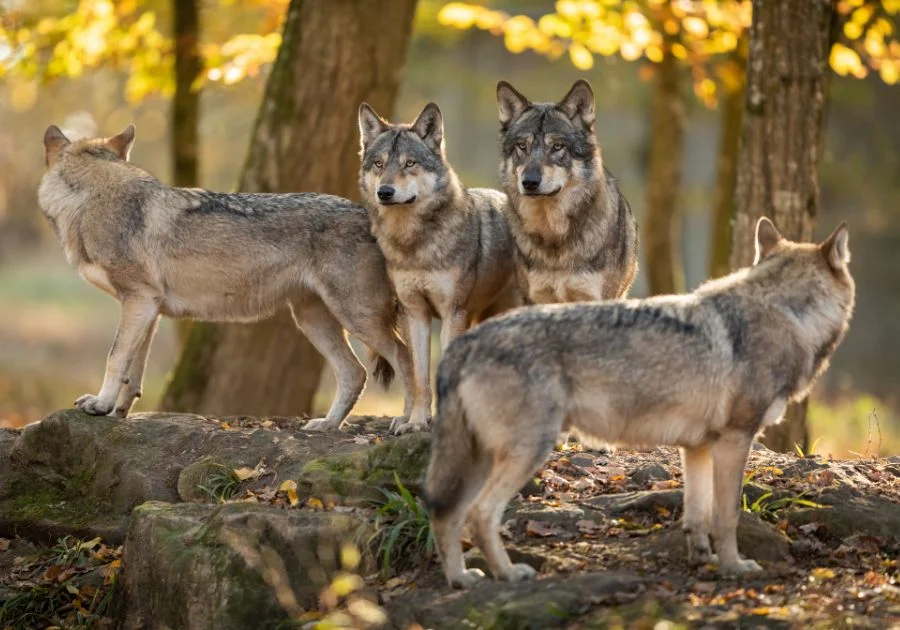
Drawing from the last point above, note that the major difference between wolves and dogs is that dogs are easier to domesticate.
Can a wolf be trained to be friendly to humans? Certainly, but the risk is high, which isn’t always worth it.
A wolf that has lived amongst humans tends to develop a strong bond with its owner, seeing the owner as the alpha of the pack.2
After comparing a domesticated dog with a domestic wolf, it was discovered that wolves could form a close bond with their owners, an attachment that lasts for a long time—though it takes longer than dogs.
Even more, a well-trained wolf won’t be aggressive toward a stranger but still likes its freedom and independence.
But we should remember that wolves are wild by nature, and while it is possible to dilute that wildness in a wolf pup, it never completely disappears.
Those instincts will always pop up, and as we’ll soon see, that makes it more challenging to have them as pets.
Are Wild Wolves Friendly to Humans?
Approaching completely wild wolves is a different story. Wolves in the wild shy away from humans; if they feel threatened, they will attack.
While some people have reported bonding with wild wolves, it is easier said than done.
It can only be done if you isolate the wolf from its pack, and a lone wolf has many disadvantages.
It would be alienated from its pack, more prone to dangers, and lose the ability to survive in the wild.
Wild wolves are not as malicious as people think. While we often imagine them aggressively hunting down campers in packs, the truth is more complicated than that.3
Dive Deeper: How To Survive A Wolf Attack In The Wild
However, that doesn’t mean they’d warm up to humans. Due to human persecution, many wolves in the wild have learned to stay away from people instinctively.
Are Wolves Friendly to Other Animals and Pets?
Wild wolves are not the most courteous species when they meet other animals. Some animals will avoid them, and their hunting instinct could kick in.
Therefore, keeping a wild wolf close to other animals, including dogs, is not a good idea.
However, research has shown that human influence can change this.4
Wolves that were domesticated from a very young age and socialized can get along with dogs and possibly other animals.
Do Wolves Make Good Pets?
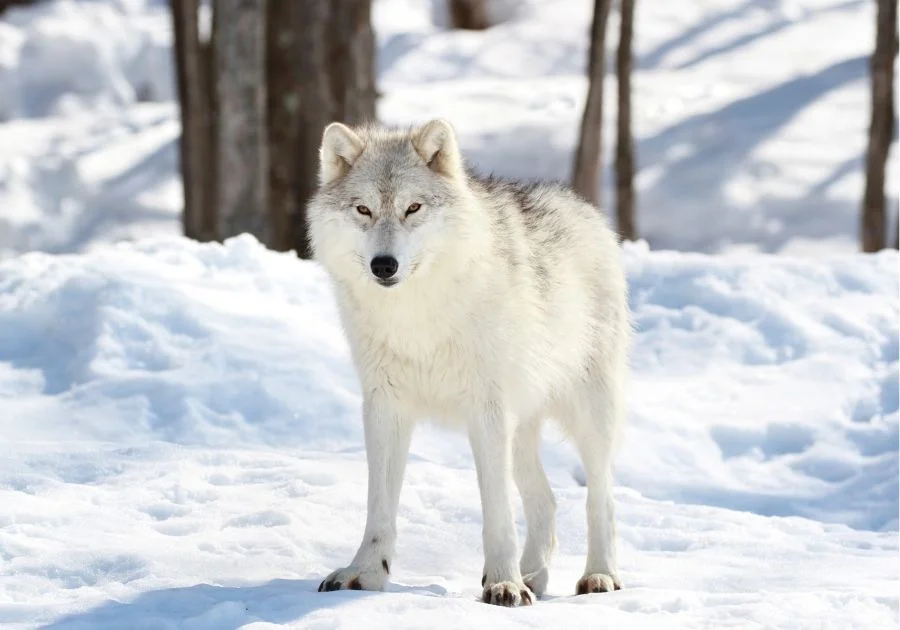
While it is possible to make a wolf a pet, it is not advisable. Unlike dogs, wolves don’t make good pets.
There are many reasons you should drop the dreams and wishes of owning a wolf, some of which are:
1. The commitment
Keeping any pet is a commitment, from cats to dogs. You’re in charge of your pet’s welfare, which can become a challenge if the dog is too big.
But as much as a big dog offers its share of troubles, that is nothing compared to a wolf.
A big dog needs a big space to run around and exercise; a wolf needs a wide space, and a backyard won’t suffice. We’re talking 10 to 15 square miles; not everyone can afford that.
Also, wolves require constant attention. Wolves suffer when alone, and because you’re a member of the pack, they become attached to you.
If you think a dog suffering from separation anxiety is bad, try living with an isolated wolf.
Asides from socialization, you must constantly maintain your position as alpha. Any signs of weakness will make your wolf take over.
2. Changes as the wolf sexually mature
When the wolf is still a puppy, the owner would be deceived to think a grown-up wolf will maintain the sweetness of puppyhood.
Once a wolf becomes sexually mature, it becomes more territorial, especially when a female is nearby.
Don’t bother stepping close to a female dog if you’re a man and you have a male wolf.
Sexually mature wolves also habitually mark territories by urinating, even more than dogs do. They can get destructive, too, ripping through whatever they can find.
3. Destructive behaviors
The destructive behaviors of a dog are nothing compared to a wolf, and because training a wolf is different from training a dog, some instincts will not leave.
You might as well get used to torn carpets, ripped couches, and a house in total disarray.
4. They might be too dangerous for kids
Wolves tend to have a soft spot for kids, especially when they’ve identified your family as their pack. They see the kids as cubs and are affectionate toward them.
However, wolves can’t tell the difference between their cubs and a child.
They treat both the same way, which means a wolf might try to pick up the child the way it would a cub.
That puts your child in danger. Wolves also play rough and can unintentionally hurt a child.
5. Legal processes
True wolves are considered illegal in America, but because many wolves today have some doggy genes in them, they can pass off as wolf hybrids.
However, even those are banned in some states, which might include yours.
Some bans are outright, while a couple has legal proceedings you must scale through.
6. The wildness
Wolves are wild animals, regardless of our best efforts to domesticate them.
They are meant to live free, survive by their instincts, and stay in a particular environment. Because of that, wolves are considered dangerous animals.
It might not attack you because of the bond it shares with you, but there are others to consider.
It can get aggressive towards other family members, and if it considers somewhere its territory, it might even turn on you.
Do Wolf Pups Make Good Pets?
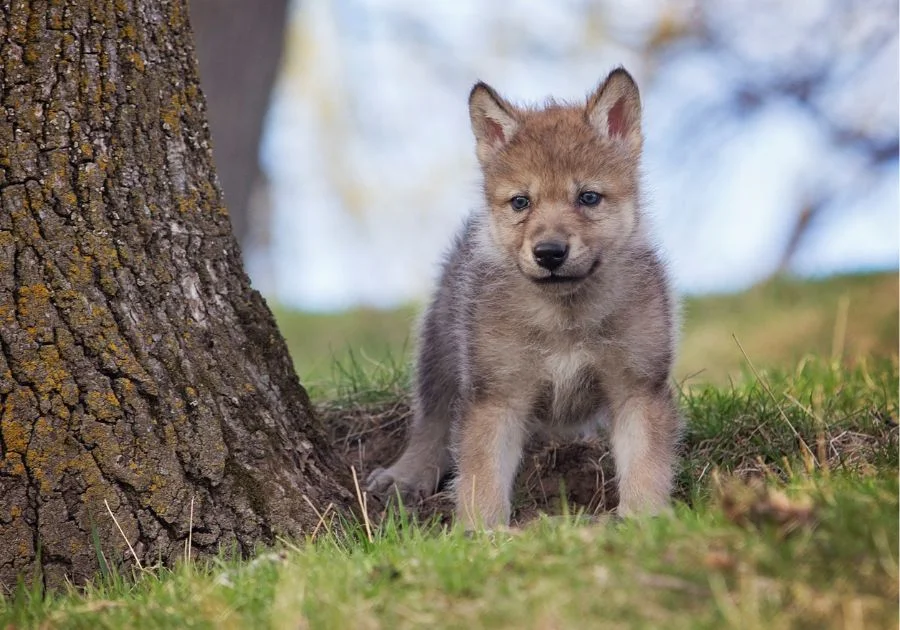
What about the wolf pups? Do they make good pets?
While a baby wolf can grow to bond with you, it won’t be the same with other humans.
There’s a limit to how domesticated a wolf can become; even wolf pups don’t make good pets.
The wildness dwells within, and it’s only a matter of time before it comes out.
If you decide to care for a baby wolf, be prepared to commit about 20 years of your life to its well-being.
The wolf’s lifespan varies, but many have been known to live up to 16, 17, and 19 years.
Do Wolf Hybrids Make Good Pets?
The wolf hybrid is less wild than a purebred wolf, but regardless of how much the dog gene is, the Wolf hybrid can still be dangerous.
It needs constant supervision, a large and fenced environment, and an owner who knows how to handle a wolfdog.
Unfortunately, many pet parents who purchase Wolfdogs are not qualified for it.
Many rescue shelters are filled with abandoned wolfdogs, and those shelters sadly find it difficult to care for these dogs. Euthanasia becomes the only option.
Alternatives to a Wolf as a Pet
Getting a wolf or a wolf hybrid as a pet is not advisable, but all hope is not lost.
There are domestic dogs that closely resemble Wolfdogs but have better personalities and are easily domesticated.
They include:
- Siberian Huskies
- Alaskan Malamutes
- Canadian Eskimo Dog
- German Shepherd
- King Shepherd
- Belgian Malinois
- Finnish Lapphund
- Samoyed
- Swedish Vallhund
These breeds have their challenges and are best for experienced owners, but they’re easier compared to a wolf or wolfdog.
FAQs
Can a wolf make a good pet?
Wolves are not bred to be pets to humans, and though they can be trained to bond with their owners, it is not advisable. There are a lot of challenges tied to domesticating a wolf or even a wolf hybrid.
Can wolves be friendly toward humans?
By nature, wolves shy away from humans and may attack if they feel threatened or intimidated. However, a wolf trained to live with humans for a long time can display friendly behavior.
Can you raise a wolf like a dog?
Wolves and dogs are related, but you can’t train the wolf the same way you will a dog. Basic obedience training work neither on wolves nor on wolfdogs.
Are wolves loyal?
Wolves are known to be pack dogs and are always loyal to their pack. They are social creatures and do many activities together. If your wolf regards you as a member of the pack, it will be loyal to you.
Bottom Line
Wolves are great animals with their own set of strengths, but those strengths are meant for the wild, not in a household.
While they are similar to man’s best friends, wolves do not share the same sentiments as dogs.
So, if you are asking if wolves are friendly to humans because you want a wolf, you can go for easier alternatives.
Check out these interesting articles:
References & Notes
- Wolf-Dog Questionnaire. Mission:Wolf.
- Differences in greeting behaviour towards humans with varying levels of familiarity in hand-reared wolves (Canis lupus). Royal Society Open Science.
- Who’s Afraid of the Big Bad Wolf. International Wolf Center.
- Social learning from humans or conspecifics: differences and similarities between wolves and dogs. Sec. Comparative Psychology.
